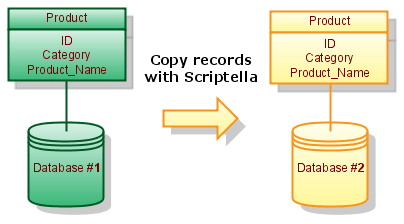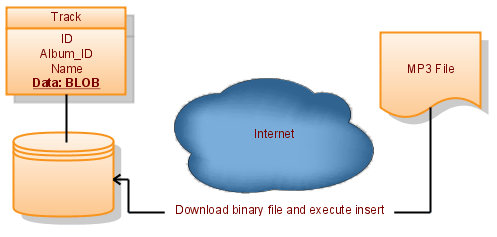Two Minute Tutorial
Installation
- Download Scriptella binary distribution.
- Unpack it and add a <SCRIPTELLA_DIR>/bin to a system PATH variable.
Use set PATH=%PATH%;SCRIPTELLA_DIR\bin for Windows and export PATH=${PATH}:SCRIPTELLA_DIR/bin for Unix.
- Check if JRE has been installed correctly by running java -version.
- Optional step: Put JDBC drivers required by your scripts to <SCRIPTELLA_DIR>/lib directory or directly specify classpath attribute in script connection elements.
Use Scriptella as Ant Task
In order to use Scriptella as Ant task you will need the following taskdef declaration:
<taskdef resource="antscriptella.properties" classpath="/path/to/scriptella.jar[;additional_drivers.jar]"/>
<connection driver="sybase" classpath="jconn3.jar"/>
Running Scriptella files from Ant is simple:
<etl/> <!-- Execute etl.xml file in the current directory -->
or
<etl file="path/to/your/file/> <!-- Execute ETL file from specified location -->
Command-Line Execution
Just type scriptella to run the file named etl.xml in the current directory. Alternatively you can use java launcher:
java -jar scriptella.jar [arguments]
Executing ETL Files from Java
It is extremely easy to run Scriptella ETL files from java code. Just make sure scriptella.jar is on classpath and use any of the following methods to execute an ETL file:
EtlExecutor.newExecutor(new File("etl.xml")).execute(); //Execute etl.xml file
EtlExecutor.newExecutor(getClass().getResource("etl.xml")).execute(); //Execute etl.xml file loaded from classpath
EtlExecutor.newExecutor(
servletContext.getResource("/WEB-INF/db/init.etl.xml")).execute(); //Execute init.etl.xml file from web application WEB-INF directory
See EtlExecutor Javadoc for more details on how to execute ETL files from Java code.
Examples
For a quick start type scriptella -t to create a template etl.xml file.
Copy table to another database

Assume Database #1 contains Table Product with id, category and name columns. The following script copies software products from this table to Database #2. Additionally Name column is changed to Product_Name.
etl.xml:
<etl>
<connection id="db1" url="jdbc:database1:sample" user="sa" password="" classpath="external.jar"/>
<connection id="db2" url="jdbc:database2:sample" user="sa" password=""/>
<query connection-id="db1">
<!-- Select product from software category in db1-->
SELECT * FROM Product WHERE category='software';
<!-- for each row execute a script -->
<script connection-id="db2">
<!-- Insert all selected products to db2
use ? to reference properties, columns or ?{expressions}-->
INSERT INTO Product(id, category, product_name) values (?id, ?{category}, ?name);
</script>
</query>
</etl>
Working with BLOBs

The following sample initializes table of music tracks. Each track has a DATA field containing a file loaded from an external location. File song1.mp3 is stored in the same directory as etl.xml and song2.mp3 is loaded through the web.
etl.xml:
<etl>
<connection url="jdbc:hsqldb:file:tracks" user="sa" password=""/>
<script>
CREATE TABLE Track (
ID INT,
ALBUM_ID INT,
NAME VARCHAR(100),
DATA LONGVARBINARY
);
<!-- Inserts file with path relative to executed script location -->
insert into Track(id, album_id, name, data) values
(1, 1, 'Song1.mp3', ?{file 'song1.mp3'});
<!-- Inserts file from URL-->
insert into Track(id, album_id, name, data) values
(2, 2, 'Song2.mp3', ?{file 'http://musicstoresample.com/song2.mp3'});
</script>
</etl>
Supporting several SQL dialects
<dialect> element allows including vendor specific content. The following example creates database schema for Oracle/HSQLDB or MySql depending on a selected driver:
<etl>
<properties><!-- Load external properties -->
<include href="etl.properties"/>
</properties>
<connection url="$url" user="$user"
password="$password" classpath="$classpath"/>
<script>
-- In this example dialects are used to
-- include different DDLs for data types:
-- Example: oracle-schema.sql for Oracle
<dialect name="hsql"> <!-- Regular expressions syntax supported-->
<include href="hsqldb-schema.sql"/>
</dialect>
<dialect name="oracle">
<include href="oracle-schema.sql"/>
</dialect>
<dialect name="mysql">
<include href="mysql-schema.sql"/>
</dialect>
-- SQL92 inserts - no need to use dialects
INSERT INTO Product(id, category, product_name)
VALUES (1, 'ETL', 'Scriptella ETL');
INSERT INTO Product(id, category, product_name)
VALUES (2, 'Development', 'Java SE 6');
</script>
</etl>

